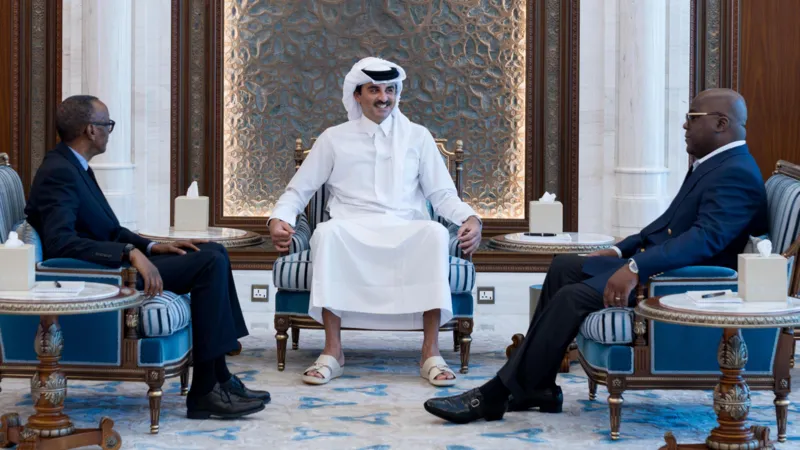Already a subscriber? Make sure to log into your account before viewing this content. You can access your account by hitting the “login” button on the top right corner. Still unable to see the content after signing in? Make sure your card on file is up-to-date.
In a rare diplomatic breakthrough, the presidents of the Democratic Republic of Congo (DRC) and Rwanda have met in Qatar amid an escalating conflict in eastern DRC, where Rwanda-backed M23 rebels have seized key cities and are vowing to overthrow the country’s government.
Some shit you should know before you read: If you’re unaware, there’s an ongoing war in the DRC that goes back to 2012, when the M23 rebels broke off from the Congolese army. At the time, M23 accused the government of failing to honor a peace agreement. The conflict is rooted in ethnic tensions, political power struggles, and control over the region’s vast mineral wealth, which includes trillions of dollars worth of rare earth materials such as cobalt, gold, and tin. Rwanda is accused of backing M23 by providing military support, weapons, and logistical assistance, allegedly profiting from the illegal export of these minerals. Despite the accusations, Rwanda denies any involvement, insisting its actions are focused on securing its border from armed groups operating within DRC. Throughout the war, M23 has been accused of severe human rights abuses, including mass executions, recruitment of child soldiers, and rape, leading to mass displacements and a dire humanitarian crisis. Two weeks ago, the US rolled out sanctions against Rwanda’s Minister of State over accusations that he was assisting M23.

What’s going on now: The meeting between DRC President Félix Tshisekedi and Rwandan President Paul Kagame in Qatar, mediated by Emir Sheikh Tamim bin Hamad Al Thani, focused on de-escalating the ongoing conflict in eastern DRC. With M23 rebels seizing key territories and worsening a humanitarian crisis, the leaders agreed to quickly resolve tensions through dialogue. Notably, this was their first direct talks since the violence escalated, marking a significant diplomatic step despite ongoing hostilities.
In their joint statement, Tshisekedi and Kagame called for an “immediate and unconditional ceasefire” but did not outline specific mechanisms for enforcing or monitoring it. They also stressed the importance of continued negotiations to establish “solid foundations for lasting peace” and acknowledged the role of regional and international mediation in the process.
Despite all of this, it remained unclear whether the M23 rebels, who refused to attend peace talks in Angola days earlier, would comply with the ceasefire.
This comes after significant pressure has been put on Rwanda, which has faced sanctions from various Western countries, including the United States, as well as the European Union. Belgium, in particular, has been one of the most vocal critics of Rwanda’s support for the M23 rebels, backing EU sanctions against senior Rwandan military officials and the head of its state mining agency. In response, Rwanda announced it was severing diplomatic ties with Belgium “effective immediately,” accusing the country of taking sides in the regional conflict and working to “systematically mobilize against Rwanda.” Belgium condemned the move as “disproportionate” and expelled all Rwandan diplomats from the country.






